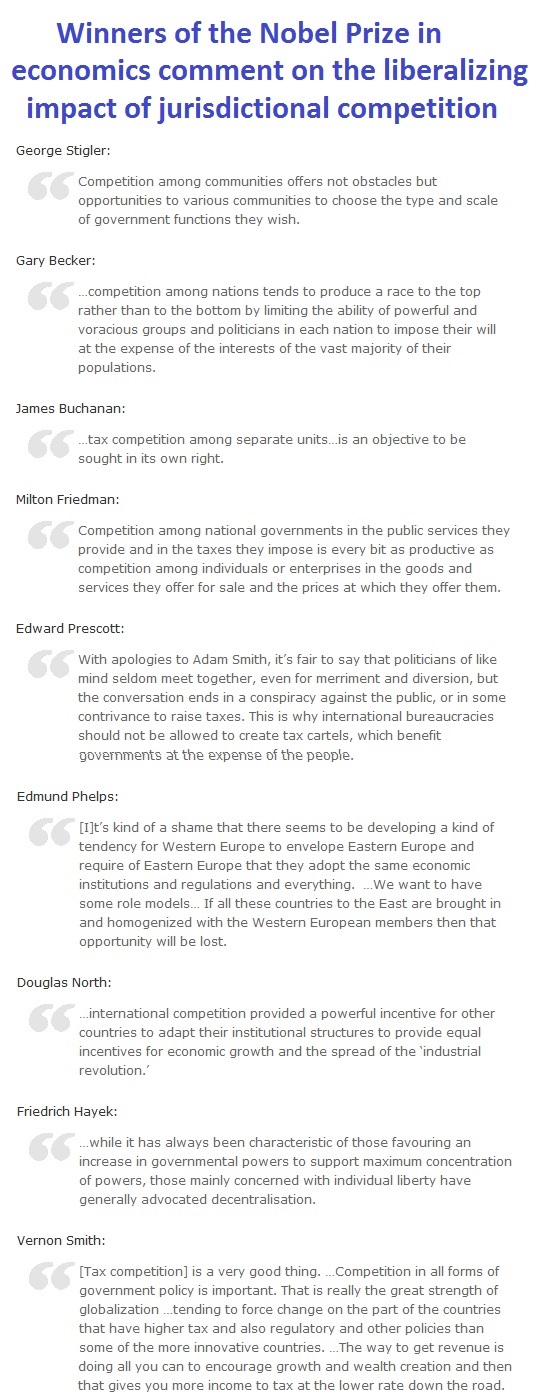

Mossack Fonseca, the firm that leaked eleven million documents pertaining to tax shelters by oligarchs and global leaders.
Economists certainly don’t speak with one voice, but there’s a general consensus on two principles of public finance that will lead to a more competitive and prosperous economy.
- Lower tax rates are more conducive to work and entrepreneurship than higher tax rates.
- Reducing the tax bias against capital formation will improve growth by increasing saving and investment.
To be sure, some left-leaning economists will say that high tax rates and more double taxation are nonetheless okay because they believe there is an “equity vs. efficiency” tradeoff and they are willing to sacrifice some prosperity in hopes of achieving more equality. I disagree, mostly because there’s compelling evidence that the left’s approach ultimately leads to less income for the poor, but this is a fair and honest debate. Both sides agree that lower rates and less double taxation will produce more growth (though they’ll disagree on how much growth) and both sides agree that a low-tax/faster-growth economy will produce more inequality (though they’ll disagree on whether the goal is to reduce inequality or reduce poverty). Since I’m on the low-tax/faster-growth side of the debate, this is one of the reasons why I’m a big fan of tax competition and tax havens. Simply stated, when politicians have to worry that jobs and investment can cross borders, they are less likely to impose higher tax rates and punitive levels of double taxation. Interestingly, even thestatist bureaucrats at the Organization for Economic Cooperation and Development (who, ironically, get tax-free salaries) agree with me, writing that tax havens “may hamper the application of progressive tax rates.” They think that’s a bad thing, of course, but we both agree that tax competition means lower rates. And look at what has happened to tax rates in the past few years. Now that politicians have undermined tax competition and weakened tax havens, tax rates are climbing. So I was very surprised to see some economists signed a letter saying that so-called tax havens “serve no useful economic purpose.” Here are some excerpts.
The existence of tax havens does not add to overall global wealth or well-being; they serve no useful economic purpose. …these jurisdictions…increase inequality…and undermine…countries’ ability to collect their fair share of taxes. …There is no economic justification for allowing the continuation of tax havens.
You probably won’t be surprised by some of the economists who signed the letter. Thomas Piketty was on the list, which is hardly a surprise. Along with Jeffrey Sachs, who also has a track record of favoring more statism. Another predictable signatory is Olivier Blanchard, the former top economist at the pro-tax International Monetary Fund. The only surprise was that Angus Deaton, the most recent recipient of the Nobel Prize for economics, signed the letter. But if that’s an effective “appeal to authority,” there’s a far bigger list of Nobel Prize winners who recognize the economic consensus outlined above and who understand a one-size-fits-all approach would undermine progress.  In other words, there is a very strong “economic purpose” and “economic justification” for tax havens and tax competition. Simply stated, they curtail the greed of the political class. Philip Booth of the Institute of Economic Affairs in London opined on this issue. Here’s some of what he wrote for City A.M.
In other words, there is a very strong “economic purpose” and “economic justification” for tax havens and tax competition. Simply stated, they curtail the greed of the political class. Philip Booth of the Institute of Economic Affairs in London opined on this issue. Here’s some of what he wrote for City A.M.
…the statement that tax havens “have no useful purpose” is demonstrably wrong and most of the other claims in the letter are incredible. Offshore centres allow companies and investment funds to operate internationally without having to abide by several different sets of rules and, often, pay more tax than ought to be due. …Investors who use tax havens can avoid being taxed twice on their investments and can avoid being taxed at a higher rate than that which prevails in the country in which they live, but they do not avoid all tax. …tax havens also allow the honest to shelter their money from corrupt and oppressive politicians. …one of the advantages of tax havens is that they help hold governments to account. They make it possible for businesses to avoid the worst excesses of government largesse and crazy tax systems – including the 39 per cent US corporation tax rate. They have other functions too: it is simply wrong to say that they have no useful purpose. It is also wrong to argue that, if only corrupt governments had more tax revenue, their people would be better served.
Amen. I especially like his final point in that excerpt, which is similar to Marian Tupy’s explanation that tax planning and tax havens are good for Africa’s growth. Last but not least, Philip makes a key point about whether tax havens are bad because they are sometimes utilized by bad people.
…burglars operate where there is property. However, we would not abolish property because of burglars. We should not abolish tax havens either.
When talking to reporters, politicians, and others, I make a similar point, arguingthat we shouldn’t ban cars simply because they are sometimes used as getaway vehicles from bank robberies. The bottom line, as Professor Booth notes, is that we need tax havens and tax competition if we want reasonable fiscal systems. But this isn’t simply an issue of wanting better tax policy in order to achieve more prosperity. In part because of demographic changes, tax havens and tax competition are necessary if we want to discourage politicians from creating “goldfish government” by taxing and spending nations into economic ruin. [brid video=”37709″ player=”2077″ title=”The Economic Case for Tax Havens”] [mybooktable book=”global-tax-revolution-the-rise-of-tax-competition-and-the-battle-to-defend-it” display=”summary” buybutton_shadowbox=”true”]



